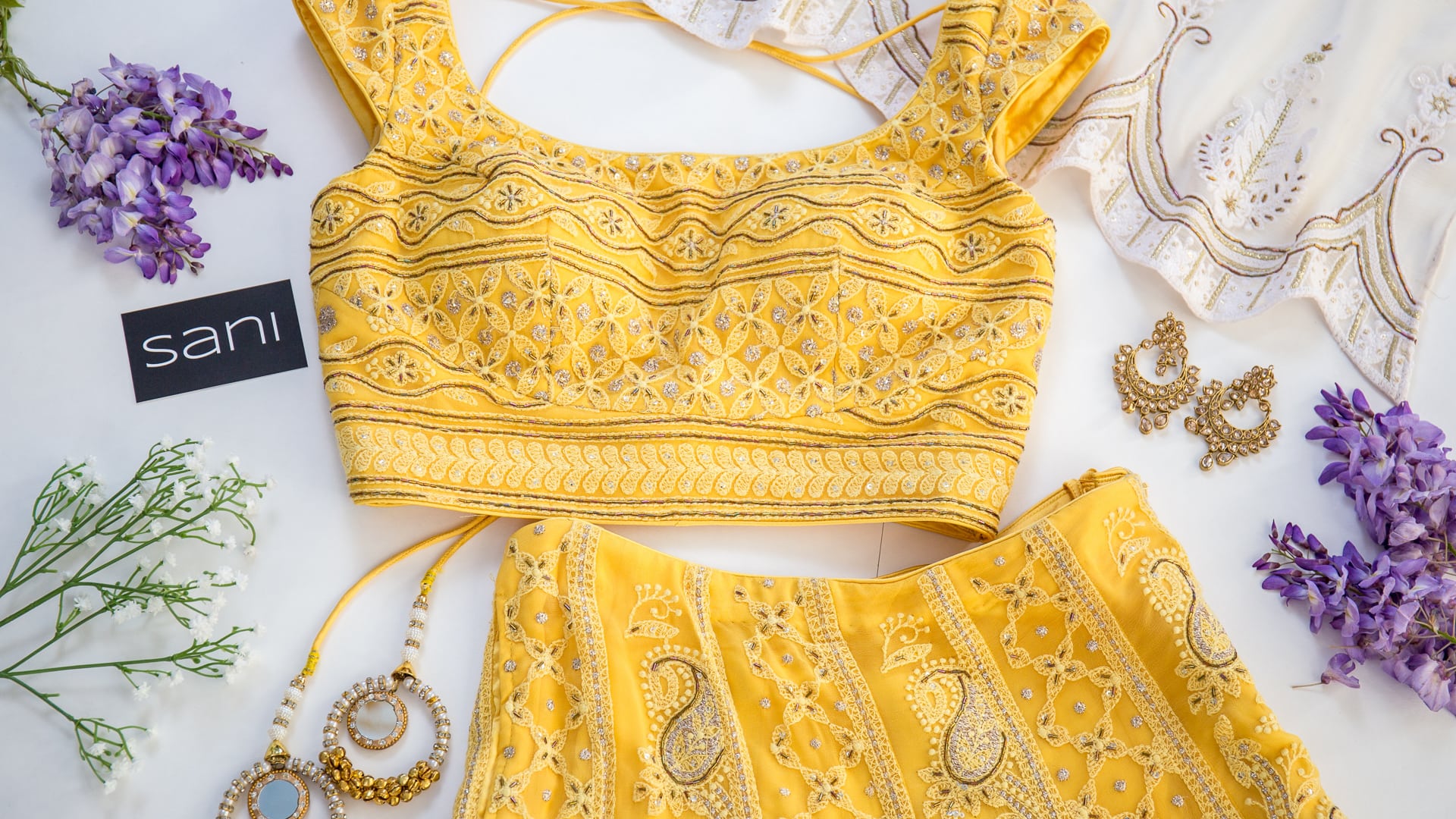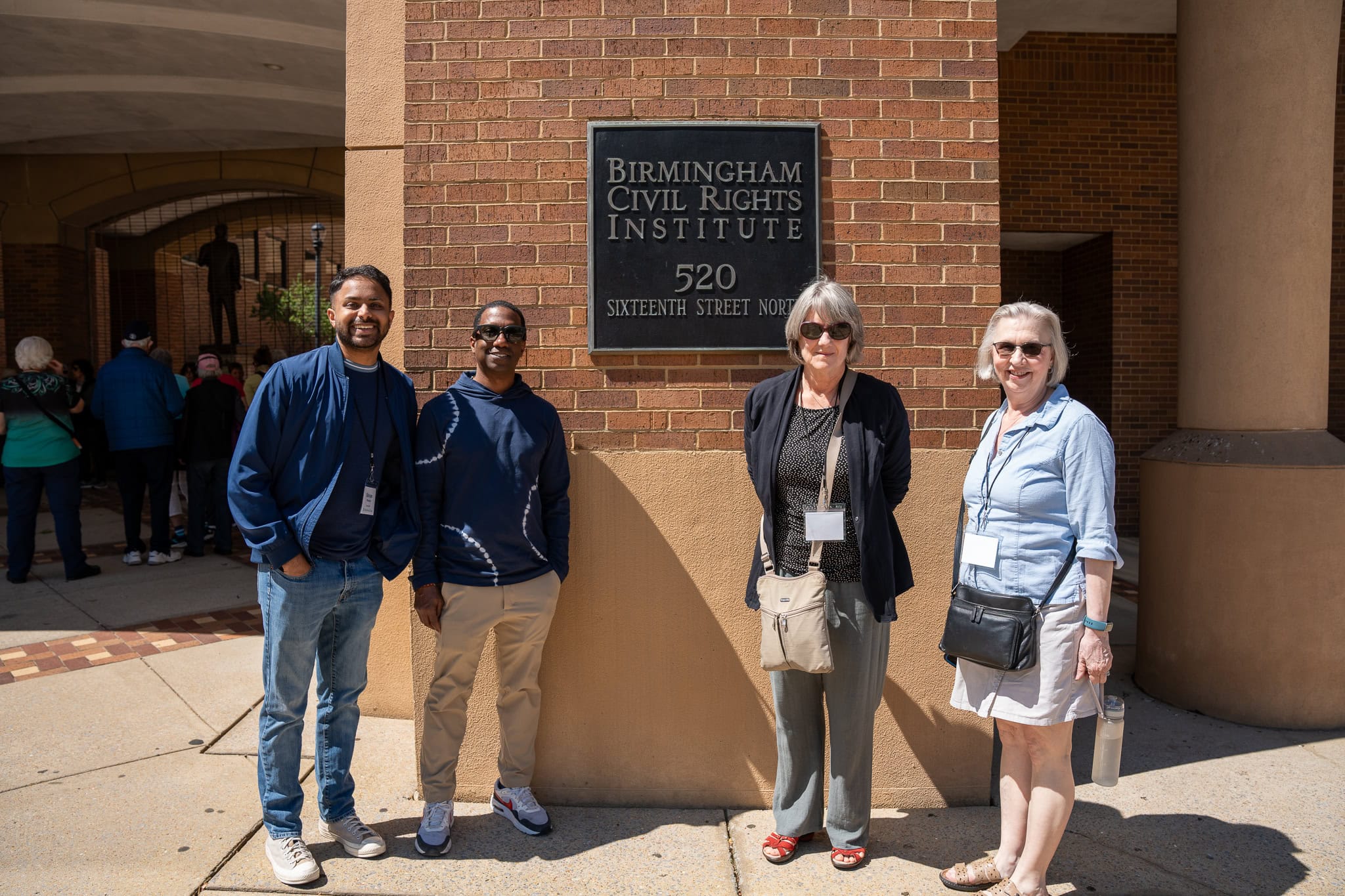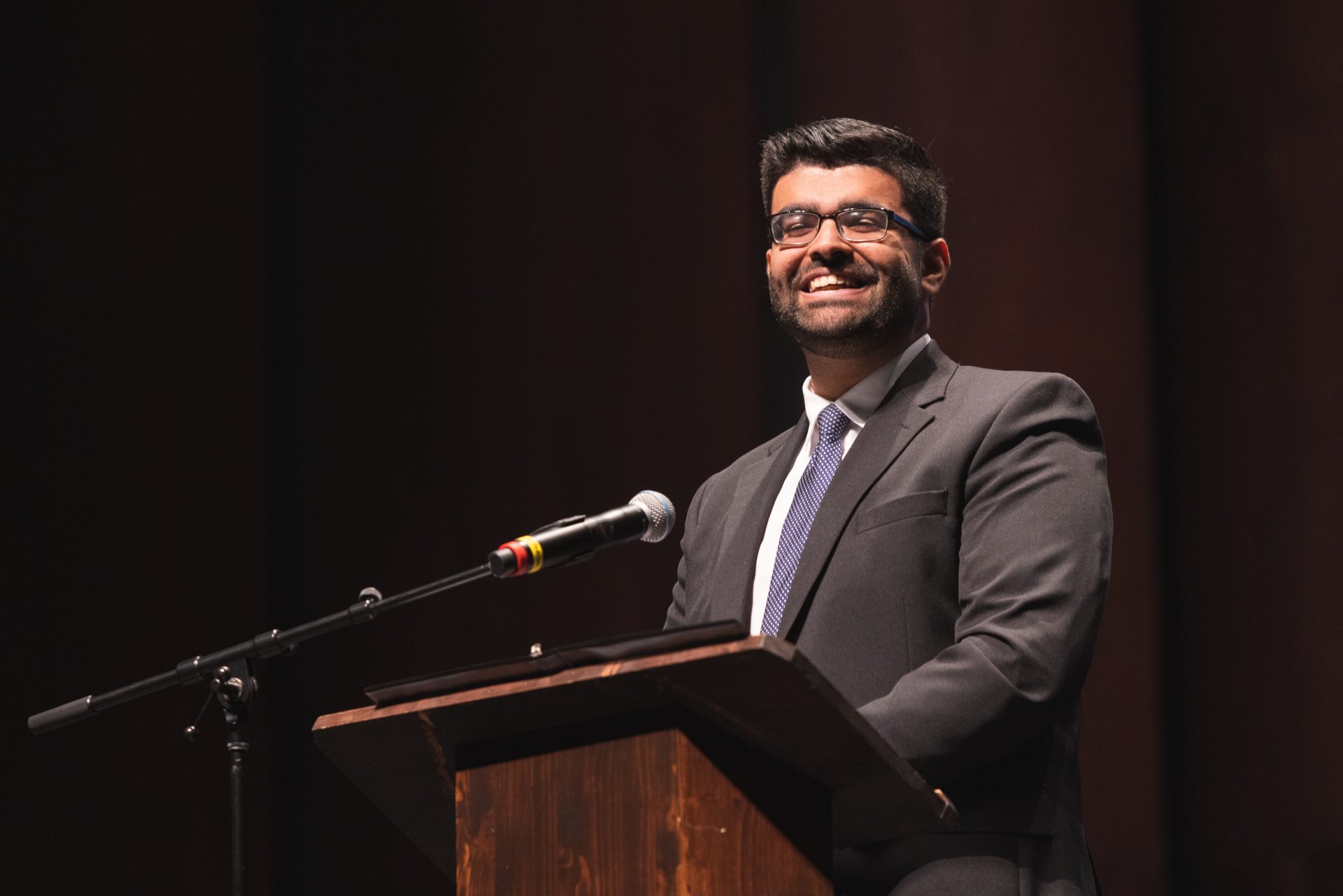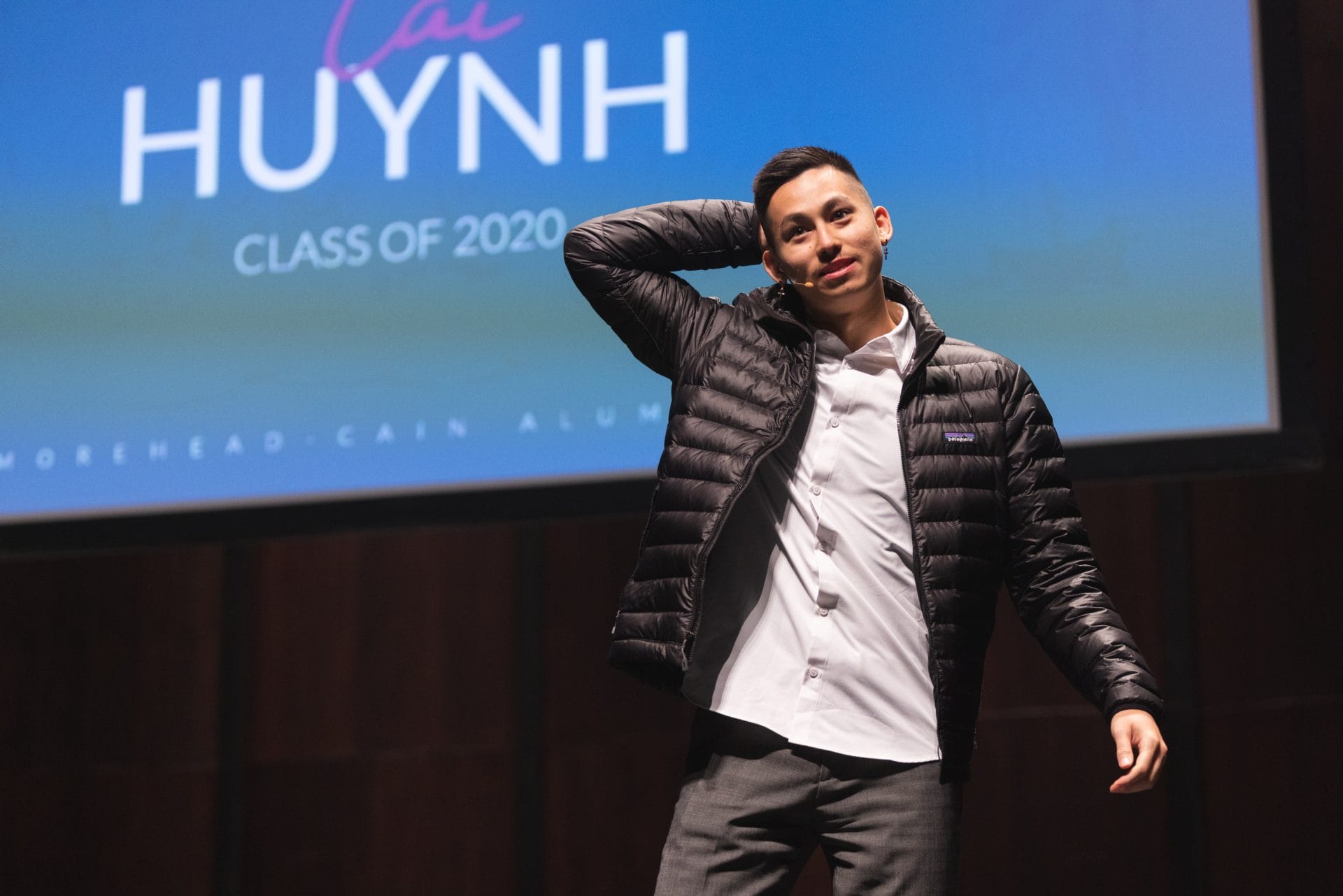
Each Sani piece is ethically made in India.
The Catalyze podcast returns with Season Four, headlining with Niki Shamdasani ’15, the co-founder and CEO of Sani Designs.
People told Niki and her sister, Ritika, that they were “delusional” for aspiring to break into the fashion world with South Asian formalwear. But in the past two years, the sisters have proved the naysayers wrong in big ways.
Sani recently launched a partnership with Rent the Runway, a fashion subscription service for luxury items, to increase access to Indian occasion wear for women across the globe. In between business trips, Niki stopped by the Foundation in Chapel Hill to share the news and what’s next for the startup.
Niki graduated with a political science major and business administration minor from Carolina.
You can learn more about the company on their website or Instagram, and you can shop Sani’s styles on Rent the Runway. The Sani Fashion Show, previously scheduled for April 5 as a benefit event for UNC Children’s Hospital, has been postponed to this fall due to the expanding COVID-19 pandemic.
Music credits
The episode’s intro song is by scholar Scott Hallyburton ’22, guitarist of the band South of the Soul.
How to listen
On your mobile device, you can listen and subscribe to Catalyze on Apple Podcasts or Spotify. For any other podcast app, you can find the show using our RSS feed.
Catalyze is hosted and produced by Sarah O’Carroll for the Morehead-Cain Foundation, home of the first merit scholarship program in the United States and located at the University of North Carolina at Chapel Hill. You can let us know what you thought of the episode by finding us on social media @moreheadcain or you can email us at communications@moreheadcain.org.
Episode transcription
(Sarah)
The past month has been unlike any that Carolina, that the world, has ever experienced. We know many of you have had your lives upended by the impact of the Coronavirus. We want our scholars, from the incoming class to our graduating seniors, our alumni, and everyone else in the Morehead-Cain community to know that we are here for you.
Despite all of the uncertainty that the pandemic has caused, we want to share some positive stories from the Foundation, starting with today’s episode featuring Niki Shamdasani, class of 2015. And now, onto the show.
Welcome to Catalyze. I’m your host, Sarah O’Carroll. I spoke with Niki in early March about Sani and how a recent partnership with Rent the Runway will increase access to South Asian formalwear for women across the globe.
Niki, thanks so much for coming down to Chapel Hill to speak with me today.
(Niki)
Thank you for having me.
(Sarah)
We at the Foundation have been so excited to see all the headlines from Good Morning America, Business Insider, and ABC News, on the partnership with Rent the Runway, the fashion subscription service. I’d love to hear how that came about and what first spawned the idea to contact the company to begin with.
(Niki)
We’re so excited about this partnership. So we launched South-Asian Fashion on Rent the Runway, launched is the new vertical, and it all started a bit over a year ago. We had been thinking about rental platforms for Sani to be on in general because we had clientele that were non-Asian. They were coming to us when they were planning on attending South Asian events and would ask, “Is there a rental option? Because I don’t know if I’ll go to another South Asian wedding, and I’m not sure if I should buy or not.”
There were these people that were kind of in between. And so we had been thinking about it for a while. And we had always thought that Rent the Runway would be the perfect destination for our clothes as a go-to already for designer clothing, for occasion wear. I mean, they’ve spent so much time figuring out how to make the experience great for the customer. So we’d been thinking about them but hadn’t reached out.
So I was listening to the podcast, “How I Built This,” and Jennifer Hyman, the CEO of Rent the Runway, was on there. And she talked about how she had cold-emailed Diane von Furstenberg, a big designer, when she was starting Rent the Runway. And you know that that was in a lot of ways, you know, how it got her business rolling and everything. And so I was just inspired when I heard that and decided to email her and, you know, didn’t have her email, but tried a bunch of different ones until it seemed like one worked and basically pitched her the idea.
It’s amazing to me that someone at her level actually forwarded my email on. And from there I was in touch with her team. And, you know, it took a year for this to happen because it was a new category. So fabrics had to be tested and a lot of things had to come together. But it finally did. And we’ve been really excited about the feedback and everything.
(Sarah)
Now, has fashion always been a passion of yours and something that you knew you would want to get into? I know that you co-founded with your sister — so how did this decision come about to start your own company?
(Niki)
So fashion was never, ever on my radar. I mean, not that what you study in college necessarily determines what you’re doing, but I studied political science and business. I was excited by startups, by politics. Nothing to do with fashion. My excitement has always been around creating new things and problem solving. And so when I was in New York a little over two years ago and had just left my job at a startup accelerator, my sister was spending the summer with me and we kind of had the head space to be able to think about this problem that we personally experienced of trying to find this South Asian fashion that, you know, we could see ourselves in through an experience that worked well, and we just didn’t.
That was really the impetus, again, like problem solving, especially for ourselves and then going from there. And so Sani was really started to create value at the intersection of design and experience. So our designs are rooted in South Asian heritage and the culture and the craftsmanship. And then we fuse it with the perspectives of first-generation South Asian Americans. And we tie it all together through an experience that’s meant to make the cultural clothing more accessible.
And what I mean by accessible is that 82 percent of South Asian Americans still go abroad, like to India, to buy their cultural clothing. 82 percent. That was a mind-blowing statistic to us. And there are over eighty-thousand South Asian weddings happening in North America alone each year. So there are a lot of people that need these clothes, but they’re not finding what they want over here. And so that was really why we started to figure that out and to give people more accessibility over here.
So 2020 is just about taking that to the next level. We have some exciting new partnerships coming up. We have a new website and in-person experience that will actually be launching pretty soon. And so it’s all about taking the learnings and the foundation we’ve created over the past two years and taking it to the next level.
(Sarah)
Was there a moment when you and your sister were collaborating on this and realized, OK, this is going to work, that we have something here and we see the market for it and we’re going to go with it?
(Niki)
So I wouldn’t say there’s necessarily been one moment. I mean, from the very beginning, a lot of people told us, “You are entering the hardest market.” I mean fashion in general. You know, people say it’s a hard business. And then when it comes to South Asian fashion, which is this particular category where there are so many culturally-entrenched mindsets, people thought we were kind of delusional for wanting to do this. And I know that some people still think that.
But first for us, it was again, not one moment, but several moments when we’d hear customers say something like, “Wow, it’s so cool that I don’t have to go to India to get what I want now.” A young woman who had never been interested in South Asian clothing before was like, “I want so many of the pieces here. I can’t decide.” You know, things like that over and over this Rent the Runway partnership and getting the feedback that continues to make us feel like we’re doing the right thing.
And obviously there are tons of lows within that, too. But I think a lot about the difference between being persistent and stupidity, and how to tell the difference between the two. When are you just chasing after something that might not work? And I think what determines which one it is is really adapting and learning from the feedback. And so it’s not that we’ve been doing the same things over and over again in service of this mission. We’ve been continuously adapting.
And I think that’s what makes me feel like it’s working, as a long answer here to your short question. It’s that we continue to learn. We continue to, I think, become better based on the feedback. And we’re just gonna keep doing that until, you know, we are the go-to South Asian brand outside of India and South Asia.
(Sarah)
Well, it seems like you are well on your way to being that already. You mentioned some mentors that have given you feedback. And so were any of those from during your time in the Morehead-Cain program, even if it maybe didn’t click at the time, because you said fashion wasn’t super on the mind, but but later on, and seeing how those words or experiences might have affected you for where you are today.
(Niki)
Absolutely. It’s really about a mindset. I think what I got from Carolina and the Morehead-Cain experience is a mindset of continuing to try new things, even if you are failing at some. All of those things, right? And sometimes, it’s a mindset of just continuing to push forward, to push yourself. And, you know, there were a lot of things, a lot of internships and experiences that just wouldn’t have been possible without the Morehead-Cain.
But, you know, because I had the support from it, I was able to try something that I just wouldn’t have thought of before. Like when I entered Carolina, I thought, I’m going to go work in Washington, D.C. one day and I’m going to be, you know, a political aide or something like that. And that obviously shifted pretty dramatically because I was able to do an internship with Corey Ford, a Morehead-Cain alumna who ran Matter, the startup accelerator, and I was able to work with Sallie Krawcheck at Ellevate and experience all of these things which kind of, you know, would teach me, again, problem-solving, how to just tackle a really big problem and figure it out along the way.
And from Carolina in general, I continue to be pretty involved with the entrepreneurial community through Innovate Carolina, 1789 [Student Venture Fund], and my entrepreneurship, minor. And so I get to work with students. You know, I mentor some through 1789, but really I get to be around incredible people who are pushing themselves and kind of just giving all of their selves to a variety of different things. And so, I mean, that’s what I have learned and what I continue to learn from Carolina. And this program, as well, was totally at the core of what we’re doing
(Sarah)
We’ll be right back. We may be off UNC’s campus for now, but we can still be connected.
(Sarah)
Join us this Wednesday, April 1st at 11:00 a.m. Eastern Daylight Time for our Alumni Speaker Series with David Gardner, class of ’88. David is the founder and “Chief Rule Breaker” for the financial services company The Motley Fool. David will offer financial and investment advice amidst this market volatility. RSVP on the MCN to access the Zoom link.
(Sarah)
To go back to the dresses and the formal wear itself, was there any inspiration that went into the design of them and how you wanted to convey that?
(Niki)
Absolutely. So one place I’ll start is that a lot of people think that all South Asian fashion is categorized by the word: “Sari.” But “sari” is only one style within South Asian fashion. So actually at the very beginning, we wanted to be really intentional about making people aware of the other styles that are there. And so we tend to do a bunch of styles that we’ve always been most comfortable in growing up and really take the inspiration from our influences over time, from, you know, trips to India that we were able to take, where you get to see the architecture, the food, the colors.
There’s I mean, there’s so much inspiration in India. And so we often start with a silhouette that’s maybe a little bit more traditionally Indian. And then we will pick a fabric that’s a little bit more Western or just different, right, and fuse those together. Or, we’ll take kind of a more Western silhouette and then use a more traditional fabric on on that. And so it’s all about the elements that bring together both of our identities, our South Asian identity and, you know, first-generation South Asian Americans as our identity. And so inspiration really comes from everywhere. But I’d say those are kind of the core elements
(Sarah)
So in talking about this whole new market available for people who may not have to travel across countries to get this, of course, there’s always conversations about appropriation. Sani doesn’t seem…Sani seems to find tradition, and making everything look authentic to the culture, that seems to be a priority. But to what extent is appropriation part of the daily conversations that you have? And what are you thinking about in terms of how the business will both make it accessible without watering down the value and the significance for so many people around the world of how these dresses should look and the kinds of experiences that they should be had in?
(Niki)
It’s such a good question. And to us, the difference between cultural appropriation and cultural appreciation is knowledge and understanding of the context. So, you know, when there was that uproar over Coachella, you know, someone was wearing a bindi, the kind of colored dot that you wear on your forehead, it was because that item had completely been removed from its context. People didn’t understand what it means to married women in India, what it means to people.
(Sarah)
And so to us, as long as we can do a really good job of helping make sure that all people have the information — and we try to do that by describing the fabrics, describing where things are worn and things like that — then we can help make sure that it’s not appropriation. At the end of the day, we can’t completely control where or how someone else chooses to wear the clothing. But as long as we do our best of informing them, that’s all we can really do.
(Niki)
And to us, a good example of that was even with this Rent the Runway partnership. It wasn’t about just putting the clothes up for this completely new category. We actually made a video with Rent the Runway that came out yesterday, actually. And basically it describes here are the pieces; here’s where it’s from; here’s why we won’t say that this is “South-Asian fashion” because it’s such a rich, varied region. So all we’re doing is giving you a teaser, a taste to to learn more.
And we go in to show here’s how you drape it; here’s where you wear it. And so that’s another reason why Rent the Runway was really the perfect partner: they cared about that context. And that’s how we can do what you’re talking about, right, to make sure that the respect and the dignity is still given to the clothes, even as it is more globalized. And we hope one day worn from South Asian weddings to galas and everything in between.
(Sarah)
Whenever we have an alumni here at the Foundation for our Alumni Speaker Series or other types of events, scholars are always so eager to say, “OK, what can I learn from you and how do I, not replicate, but be able to implement all of this great advice into my own career plans?” Especially for those who may be looking very soon at their next steps post-graduation from Carolina. So is there anything that you would want to impart for those who have a business administration or interest in startups, perhaps that kind of caree focus? What might you encourage them to do? Is it to be persistent when things don’t always go your way or is it about resilience and the difference between resilience and stupidity, as you mentioned, or any other types of takeaways?
(Niki)
Yeah. So first of all, when starting a business, it feels like I always have to ask other people for things and I’m asking favors. So whenever I can do anything to help, I say yes as much as possible. So if there’s ever anything I can do, I hope anyone will reach out to me.
Second of all, for the actual advice, a lesson that has really sunk in relatively recently was that, if it’s meant to be, it doesn’t mean it’s going to be easy. When we were having issues with the business, whether in production or marketing or anything in between, I used to take it really personally. And really, at the end of the day, you know, I need to be better to to make sure mistakes don’t happen. But at some point, you have to understand that what’s inherent in business is that there’s going to be challenges. It’s not that if you’re doing it right, suddenly it’s going to be smooth sailing.
And what really made that stand out to me was, so, the Rent the Runway order was coming. It was finally done. And we were just waiting for it to arrive to be able to forward it on and FedEx lost our packages. And so my sister and I had to go to the distribution center, beg them to look through some trailers to be able to find it because we needed to send it out.
It finally happened that it came together but when that happened, I was like, “Why us? What should I have done differently? Just, why is this happening?” And I got on the phone with my cousin, who’s been running his own business actually in uniforms for the past ten years. And coincidentally (this might say something about FedEx; no offense to them), his packages had been lost by FedEx the week before and he had to go to the distribution center to pick it up.
It was this crazy coincidence where the same thing had happened to him. And he was like, “Yeah, you know, sometimes this stuff happens.” And it just made me realize that this is never going to stop. The problems are only going to get bigger, the challenges, I should say. And that’s just business. It doesn’t mean that, you know, as soon as you find the perfect product market fit or anything else, then you’re good to go.
For the rest of the time, it’s about continuing to tackle those and have a solution-oriented mindset instead of a complaining-oriented mindset. So that’s the advice I would give.
(Sarah)
Niki, thank you so much for coming here. And I wish you and Ritika, your sister, all the best in the year and in the years ahead.
(Niki)
Thank you so much. We couldn’t do it without your support, so we appreciate everything the Morehead-Cain Foundation has done.
(Sarah)
Thank you for listening to Catalyze. I’m your host, Sarah O’Carroll, and that was Niki Shamdasani, class of 2015. The Sani Fashion Show, a fundraiser for UNC Children’s Hospital has been postponed to this fall due to the coronavirus.
In the meantime, you can find out more about the company on their website at Sani Designs dot com or you can find them on Instagram at Sani. And of course, you can find them on Rent the Runway.
The music for the show is by scholar Scott Hallyburton ’22 with the band South of the Soul. You can let us know what you thought of the episode or who you think should be featured next by finding us on Twitter or Instagram at Morehead-Cain or you can send us an email at communications@morehead-cain.org. Until next time, Morehead-Cains, stay safe.
Note: This episode has been edited slightly for clarity.


